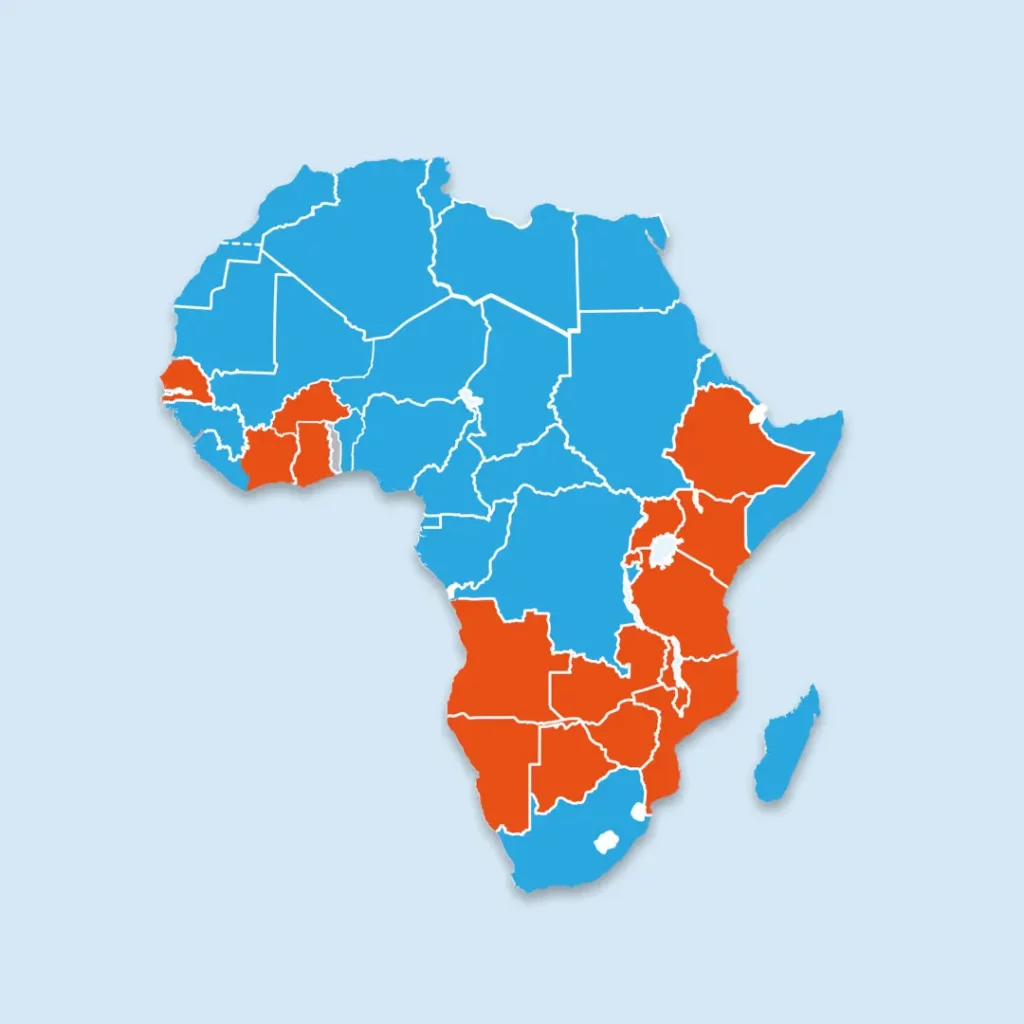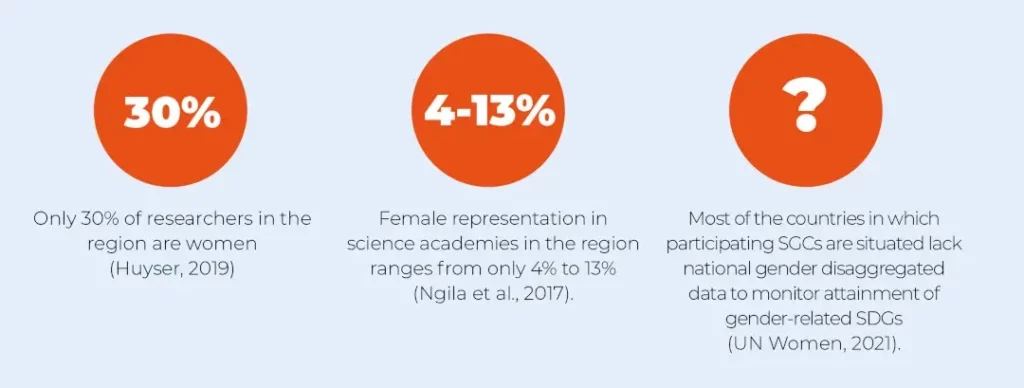Strengthening Capacities of
Science Granting Councils
in advancing Gender and
Inclusivity Transformation
Gender & Inclusivity
A PROJECT OF THE SCIENCE GRANTING COUNCILS INITIATIVE
About the project
A regional consortium of experts with a unique approach to change is working with science granting councils (SGCs) in Sub-Saharan Africa to strengthen their capacity to advance gender and inclusivity in the region’s science, technology and innovation sector (STI) – with anticipated benefits for broader society.
Led by the Human Sciences Research Council (HSRC) of South Africa in partnership with Gender at Work and the Council for the Development of Social Science Research in Africa (CODESRIA), the Gender and Inclusivity Project aims to address the fact that despite enabling global, regional and national policy and legislative frameworks, only 30% of researchers in the region are women; female representation in science academies ranges from 4-13%, and data to monitor attainment of gender-related Sustainable Development Goals are frequently non-existent.
According to Dr Ingrid Lynch, Senior Research Specialist in the HSRC’s Human and Social Capabilities programme and co-principal investigator of the project, addressing gender disparities in STI can have a positive impact on society.
“There has been growing awareness that addressing gender disparities in STI is not only a question of rights and justice, but helps to produce more inclusive teams in organisations, higher quality research, and greater relevance and impact of research and innovation – with obvious benefits for society more broadly,” says Lynch.
Through its focus on SGCs, the project acknowledges the pivotal role of these bodies in national innovation systems.
“Councils take part in setting and monitoring national research agendas and are well-placed to stimulate research designs and content responsive to gender inequality through funding projects informed by a gender transformative lens,” Lynch says.
As central role players in national systems of innovation, SGCs are key to advancing gender transformation. SGCs contribute to setting and monitoring national research agendas and stimulate research designs and content responsive to gender inequality through funding projects informed by a gender transformative lens.
Building on the existing work of SGCs, the Gender and Inclusivity Project supports the mainstreaming of an intersectional transformative approach in the development, implementation and monitoring of gender policy, programs and research in the functions of SGCs.
The Gender and Inclusivity Project is a component of the Science Granting Council Initiative (SGCI), now in its second phase (SGCI-2, 2018-2023). The SGCI is a multi-funder capacity-building initiative which has been running since 2015 and is geared towards supporting the development of research and evidence-based policies that contribute to economic and social development.
Participating councils
Participating SGCI Councils are based in Burkina Faso, Côte d’Ivoire, Ghana, Nigeria, Senegal, Kenya, Uganda, Tanzania, Rwanda, Ethiopia, Botswana, Malawi, Mozambique, Namibia, Zambia and Zimbabwe.

Why the project
Addressing gender disparities in STI is not only a question of rights and justice; it is crucial to producing more inclusive teams in organisations, higher quality research, and greater relevance and impact of research and innovation – not only for women but for society broadly. In other words, addressing gender equality is essential in advancing the continent’s STI agenda. Despite an
increasingly enabling policy and legislative environment for gender transformation, inequalities in STI remain:
- Women are under-valued and under-represented in scientific disciplines across the world especially in key leadership and decision-making positions.
- Research still carries the legacy of masculinist norms in both method and content.
- In Africa, regional policy frameworks have only partially filtered down to national level, particularly so for STI-specific national policy. While women are increasingly joining science, technology, engineering and mathematics (STEM) educational programmes, their representation dwindles the further they proceed through the ‘leaky’ STI pipeline.
- There are limited intersectional approaches to gender transformation that consider diversity related to other marginalised identities and experiences.
Key facts at a glance

Objectives of the project
This project focuses on four specific objectives to advance intersectional gender transformation in the
activities of 16 participating SGCI Councils:
- Review and consolidate information about the regional, national and institutional environments within which SGCs operate, including the work already conducted in SGCI-1;
- Co-identify capacities and needs of the 16 participating organisations, as well as key principles and targets that inform their work in advancing gender and inclusivity;
- Provide action-based learning opportunities and support to resource SGCs towards advancing gender and inclusivity in their work; and
- Develop mechanisms and an evidence base to monitor and evaluate the impact of gender and inclusivity initiatives.
Objectives of the project
Intended to facilitate sustained structural change, theproject advocates for mainstreaming an intersectional transformative approach that extends diversity beyond gender to include inequalities related to age, race, class, (dis)ability, sexuality, and others. A unique peer-learning methodology – Gender Action Learning – is underpinned by a customised, participatory process that responds to councils’ own change agendas, builds partnerships and encourages ownership over the change process. This methodology, developed by Gender at Work, will see participating SGC members, under guidance from consortium members, catalysing and leading change projects in their institutions, the outcomes of which will be shared to promote wider uptake of gender and inclusivity issues.
“In this way, learning ismore likely to be embedded and lead to sustained shifts at both individual and systemic levels,” emphasises Michal Friedman from Gender at Work.
The project is now in a phase of the process which focuses on Gender Action Learning (GAL), a process that is built on adult learning principles and values reflective space, recognising that reflection on both the self and on organisational practice is a key tool for learning and effective action. Another key factor in the GAL process is the ability for people to work together and learn from each other across SGCs.
The value of this participatory process is that SGC change teams identify priority areas for intervention that are relevant to their contexts, shape their own questions for learning and take ownership of the change process from the outset. While the goal of this process is action and change of a social system, it also facilitates increased knowledge on gender and inclusivity.
References
Huyer, S. (2019). Is the gender gap narrowing in science and technology? In UNESCO Science Report
(pp. 85-103). Paris: UNESCO.
Ngila, D., Boshoff, N., Henry, F., Diab, R., Malcom, S., & Thomson, J. (2017). Women’s representation in national science academies: An unsettling narrative.
South African Journal of Science, 113(7–8), 1–7. UN Women. (2021). SDG monitoring. Available from: https://data.unwomen.org/sdg-monitoring

